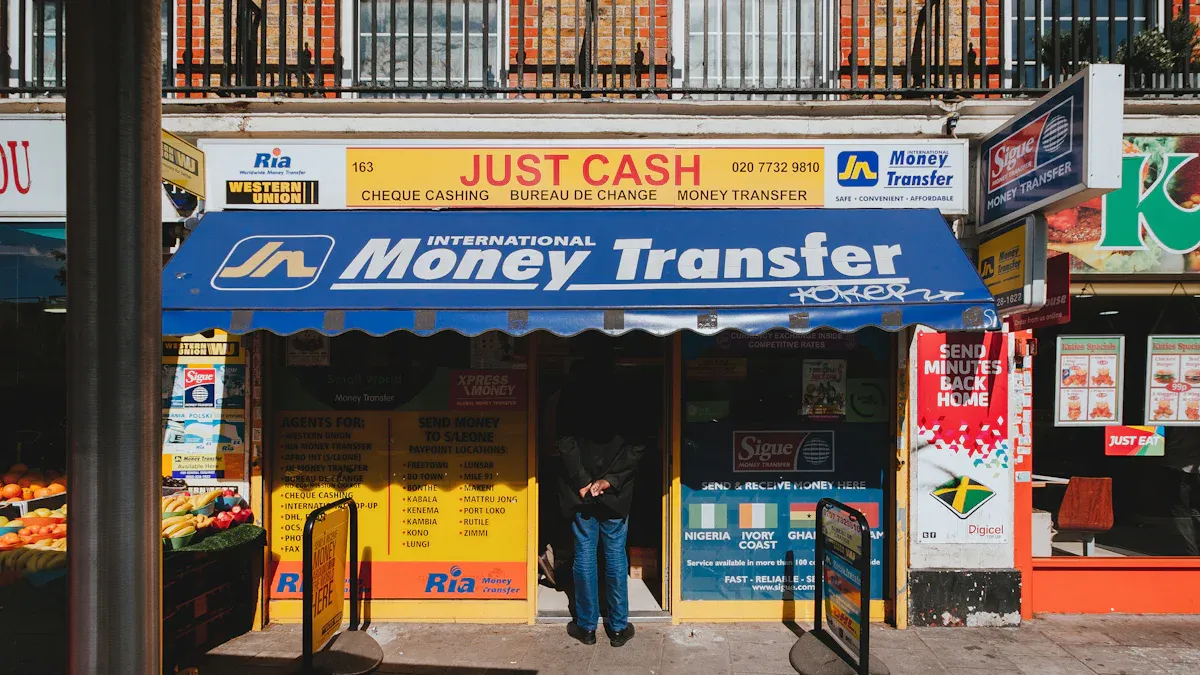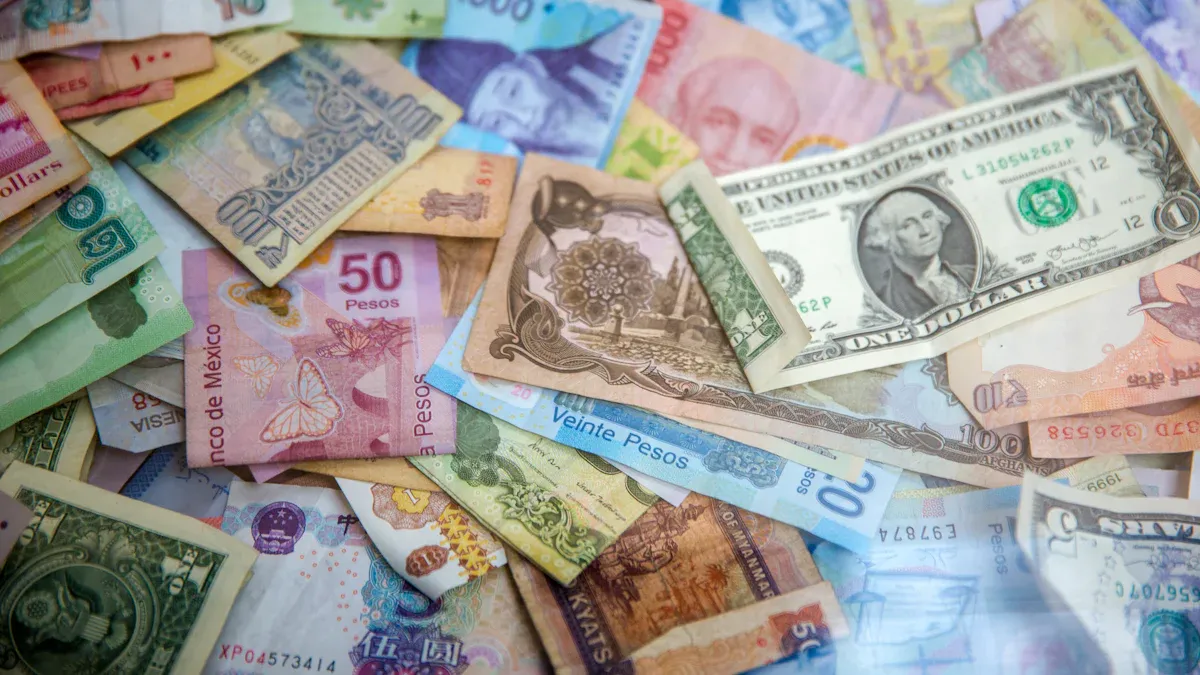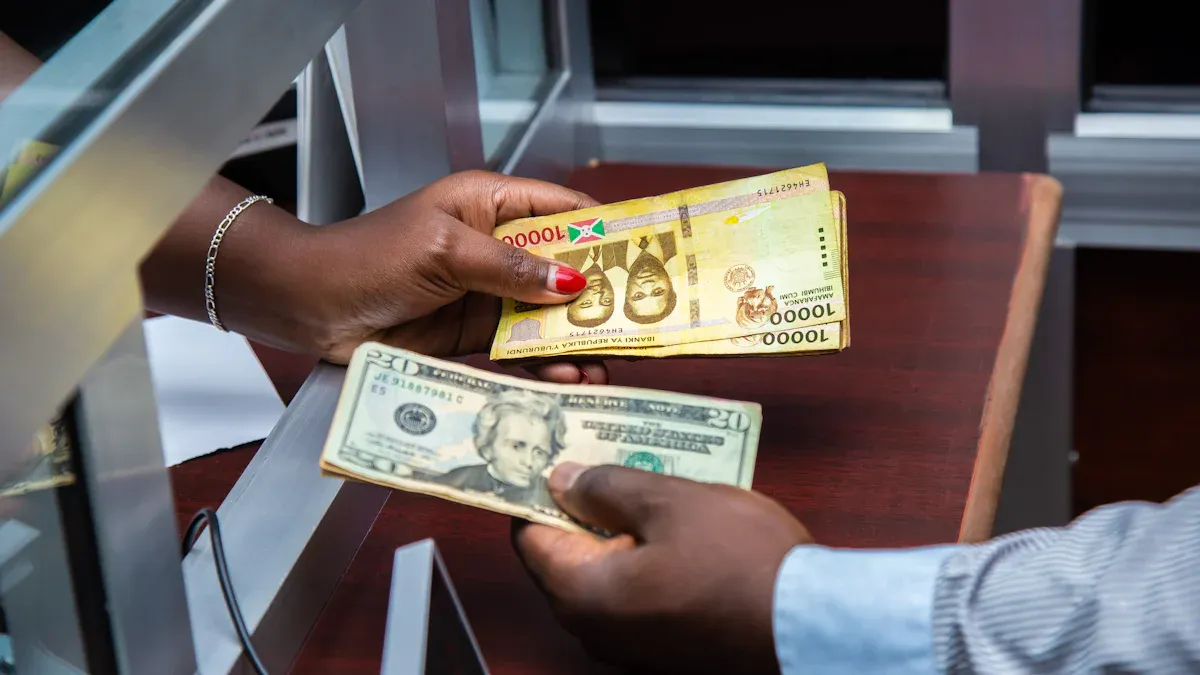- EasyCard
- Trade
- Help
- Announcement
- Academy
- SWIFT Code
- Iban Number
- Referral
- Customer Service
- Blog
- Creator
How to Send Money to Venezuela? Complete Guide

Image Source: unsplash
How to remit to Venezuela? This question may confuse you. International sanctions and drastic exchange rate fluctuations make traditional banking channels very unreliable. In fact, one report points out that only 3% of remittances are completed through formal channels, with the vast majority of funds relying on digital platforms or cryptocurrency.
Did you know? Despite the challenges, the funds flowing to Venezuela remain substantial.
Year Remittance Amount (USD) Growth Rate 2023 4,618,394,814 17% (2020-2023) 2024 (Projected) 4,849,314,555 2% (2023-2024)
This guide will provide you with a safe, efficient, and low-cost complete operation plan to help you successfully complete the remittance.
Key Points
- Traditional banking channels for remitting to Venezuela are very difficult due to international sanctions and exchange rate changes.
- Cryptocurrency (especially USDT) is a fast, cheap, and convenient remittance method that bypasses the banking system.
- Online platforms (such as Paysend) and digital wallets (such as Zinli) are simpler remittance options but may have higher fees or other restrictions.
- P2P mode (such as Zelle plus broker) allows flexible remittance but requires finding a very reliable broker.
- Before remitting, be sure to carefully verify recipient information and understand the cost, speed, and risks of different methods.
Cryptocurrency Remittance Solution
Facing the heavy obstacles of traditional channels, cryptocurrency, especially stablecoins, provides you with a modern solution. It bypasses complex banking systems, making fund flows freer and more efficient. If you are looking for a reliable method to answer the question “how to remit to Venezuela,” the cryptocurrency solution is worth exploring in depth.
Advantages of Cryptocurrency
Compared to traditional banks, cryptocurrency shows huge advantages in international remittances. Its core appeal lies in speed, cost, and accessibility.
Quick Comparison: Cryptocurrency vs. Traditional Banking
Advantage Category Cryptocurrency (Stablecoin Example) Traditional Banking System (SWIFT) Remittance Speed ⚡️ Very fast. Transactions usually complete in minutes, unrestricted by bank hours or holidays. 🐌 Very slow. International wire transfers usually take 3-5 business days or longer. Remittance Cost 💵 Low. Main fees are network transfer fees (usually under $2 USD), far below bank fees. 💰 High. Fees include remittance fees, intermediary bank fees, and high exchange rate spreads. Accessibility 🌐 Globally accessible. You only need an internet-connected device and crypto wallet, no bank account required. 🏦 Limited. You must have a bank account and are restricted by bank branches and online systems. Operation Time ⏰ 24/7. Crypto markets operate around the clock; you can initiate remittances anytime. ⏳ Limited. You can only handle business during bank hours.
Stablecoin (USDT) Operation Steps
Stablecoin is a cryptocurrency pegged to fiat currencies like the USD. Among them, USDT (Tether) is the most popular. Its value is stable, avoiding the drastic price fluctuations of cryptocurrencies like Bitcoin.
Here are the three core steps for remitting with USDT:
- Step One: Purchase USDT You first need to buy USDT with fiat currency (such as USD, EUR). You can operate through the following channels:
- International Cryptocurrency Exchanges: Register an account on global platforms like
BinanceorCEX.IO. These platforms support purchasing USDT with credit cards or bank transfers (for example, transferring USD from your licensed bank account in Hong Kong). - P2P (Peer-to-Peer) Trading: On the exchange’s P2P market, you can buy USDT directly from other users and pay with local payment methods.
- International Cryptocurrency Exchanges: Register an account on global platforms like
- Step Two: Transfer USDT to Recipient’s Wallet After purchasing USDT, it will be stored in your exchange wallet. Next, you need to transfer USDT to the recipient in Venezuela.
- Ask the recipient for their USDT wallet address. This is a long string of letters and numbers.
- Choose a transfer network. Recommend using TRC20 (Tron network), as it is fast and has very low network fees (usually around $1 USD).
- On the exchange’s withdrawal page, enter the recipient’s address, select the TRC20 network, and confirm the transfer amount.
⚠️ Important Tip: Double-Check the Address
Blockchain transfers are irreversible. Once sent to the wrong address, funds are permanently lost. Before clicking send, be sure to confirm the wallet address and transfer network with the recipient multiple times.
- Step Three: Recipient in Venezuela Exchanges Funds After receiving USDT, the recipient can easily exchange it for locally circulating currency.
- Exchange for USD Cash: Through local P2P brokers or trusted exchangers in the crypto community, exchange USDT for USD cash.
- Exchange for Bolívar (VES): On platforms like Binance P2P, the recipient can sell USDT directly to local buyers, who pay Bolívar through Venezuelan bank accounts.
Advantages and Risk Analysis
Although this method is efficient, you must also understand its two sides.
Main Advantages:
- Bypass Sanctions: Cryptocurrency transactions occur on decentralized networks, not directly through traditional banking systems affected by sanctions.
- Stable Value: Using stablecoins like USDT effectively avoids value loss during remittance.
- High Privacy: Compared to banking systems, crypto transactions provide better privacy protection.
- Financial Inclusion: Even if the recipient has no bank account, as long as they have a smartphone and internet, they can receive funds.
Potential Risks:
- Operational Threshold: For newcomers unfamiliar with cryptocurrency, operations like wallet creation and address confirmation have a learning curve.
- P2P Counterparty Risk: When finding P2P brokers in Venezuela to exchange cash, there is a risk of encountering fraud or unreliable counterparties. Be sure to choose reputable brokers.
- Fund Freeze Risk: USDT issuer Tether is a centralized company. To comply with sanctions from OFAC and others, it has the right to freeze wallet addresses marked as high-risk. Although this has less impact on ordinary users, the risk still exists.
- Network Congestion: In rare cases, blockchain networks may congest due to high transaction volume, causing delays or higher fees.
Cost and Time Estimate
Let’s estimate the total cost and time for remitting via USDT.
- Total Cost: Usually between 2% - 5%.
Purchase Cost: Buying USDT with fiat on exchanges, fees about 0.1% to 2%.Transfer Cost: Using TRC20 network, fees usually fixed around $1 USD.Exchange Cost: Recipient exchanges via P2P in Venezuela, traders usually charge 1% to 3% spread as service fee.
- Total Time: Usually completed within 1 hour.
Purchase Time: 5 - 15 minutes.Transfer Time: 5 - 10 minutes.Exchange Time: 15 - 30 minutes.
This solution far outperforms traditional bank wire transfers in both speed and cost, which take days and have high fees.
Third-Party Platforms and Digital Wallets
If you find the cryptocurrency process somewhat complex, don’t worry. There are many third-party digital platforms on the market that provide remittance methods closer to the traditional financial experience. These platforms are usually easier to use and are another effective answer to the question “how to remit to Venezuela.”
Online Remittance Platform (Paysend)
Platforms like Paysend provide a direct solution. You can think of it as a modernized, streamlined version of traditional wire transfers.
The operation process is very simple:
- Register an account on the Paysend website or app.
- Enter the amount you wish to remit.
- Provide the recipient’s bank account information in Venezuela.
- Complete payment using your overseas bank card (credit or debit card).
Paysend’s main advantage is its convenience. It eliminates the need to queue at banks, and the entire process can be completed online. The platform usually charges a fixed fee with clear and transparent exchange rates. For new users, Paysend sometimes offers fee-free promotions.
Digital Wallets (Zinli, PayPal)
Digital wallets are another very popular receipt tool in Venezuela. They allow users to hold digital USD and spend or trade locally.
- Zinli: This is a popular digital USD wallet in Latin America. You can transfer directly to the recipient’s Zinli account. After receiving funds, the recipient can use Zinli’s virtual or physical Visa card to spend in local stores that accept bank cards, greatly enhancing fund usability.
- PayPal: As a globally known payment platform, many Venezuelans have PayPal accounts. A study on Venezuelan immigrants showed that in 2023, 60% of respondents used platforms like
Binance,Zelle, orPayPal. However, withdrawing from PayPal to a Venezuelan bank account is very difficult and costly. Therefore, recipients usually need to exchange PayPal balances for cash or local currency via P2P, incurring additional fees.
P2P Mode (Zelle + Broker)
For remitters in the US, Zelle + broker is a very common P2P (peer-to-peer) remittance mode. Zelle itself is a tool for free instant transfers between US bank accounts only.
This mode works as follows:
- You transfer USD via Zelle in the US to a trusted broker’s US bank account.
- The broker’s team in Venezuela delivers equivalent USD cash or Bolívar (VES) to your recipient based on the agreed exchange rate.
This method is very flexible, but its core completely depends on the broker’s credibility.
Security Warning: Core Risks of P2P Transactions
The P2P market is full of opportunities but also risks. Experts emphasize that many users mistakenly believe digital transactions are automatically protected, but in reality, they can be as vulnerable as cash in your pocket—if not careful, easily lost. For example, a platform called HV IJEX Exchange promised high returns but was proven a scam, causing users to lose all funds.
To protect your funds, be sure to follow these security guidelines:
- Verify Broker Reputation: Prioritize brokers with long-term good transaction records. Be wary of “preferential” rates far better than market prices.
- Directly Verify Payment: Before the broker releases funds to your recipient, log in to your bank account to confirm the Zelle transfer is successful; do not rely solely on screenshots sent by the other party.
- Use Two-Factor Authentication (2FA): Enable 2FA for all your financial apps to add an extra layer of security.
- Enhance Security Awareness: Understanding platform operations and potential risks is the best way to protect yourself from fraud.
Platform Selection and Verification Requirements
Different platforms have different pros and cons. You can choose based on your needs.
| Remittance Method | Advantages | Disadvantages | Suitable For |
|---|---|---|---|
| Paysend | Simple operation, similar to online banking | Exchange rate may not be optimal, limited supported banks | Users seeking simplicity, unfamiliar with crypto or P2P |
| Zinli | Convenient for recipient use, direct spending | Remitter needs to fund own account first | Recipients needing flexible small-amount daily spending |
| Zelle + Broker | Flexible rates, cash home delivery possible | Highly dependent on broker credibility, high fraud risk | Remitters in the US who can find absolutely reliable brokers |
To comply with international anti-money laundering (AML) regulations, most legitimate platforms require identity verification (KYC). This usually requires you to submit:
- Proof of Identity: Such as a valid government-issued ID like passport or driver’s license.
- Proof of Address: Such as recent utility bills or bank statements.
- Proof of Fund Source: For larger amounts, platforms may require you to explain the legitimate source of funds.
Before starting any remittance operation, be sure to prepare these documents to ensure a smooth process.
How to Remit to Venezuela: Solution Comparison

Image Source: unsplash
After understanding cryptocurrency and third-party platforms, you may ask: Which solution is best for me? To help you make the best decision, we directly compare these mainstream solutions from four key dimensions.
Speed and Convenience Comparison
Remittance speed is one of your top concerns. Traditional remittances, such as international bank transfers, usually take up to three business days to complete. In contrast, modern digital channels show huge advantages in speed.
Core Tip: Convenience and Operational Threshold
Convenience refers not only to speed but also to ease of operation. Platforms like Paysend are closest to familiar online banking, while cryptocurrency requires some time to learn.
| Remittance Solution | Speed | Convenience |
|---|---|---|
| Cryptocurrency (USDT) | Very fast (usually within 1 hour) | Medium (requires learning wallet operations) |
| Online Platform (Paysend) | Faster (usually 1-2 business days) | High (simple and intuitive process) |
| P2P Mode (Zelle + Broker) | Fast (usually within hours) | Low (requires finding and verifying broker) |
Cost and Exchange Rate Comparison
Total cost is another decisive factor. It consists of fees and exchange rate spreads. A channel with seemingly low fees may cause you to lose more on the exchange rate.
| Remittance Solution | Total Cost (Estimate) | Exchange Rate Advantage |
|---|---|---|
| Cryptocurrency (USDT) | 2% - 5% | Excellent (close to parallel market rate) |
| Online Platform (Paysend) | 3% - 7% | Medium (platform rate, some spread) |
| P2P Mode (Zelle + Broker) | 1% - 4% | Excellent (negotiable, usually good) |
Security and Reliability Comparison
When considering how to remit to Venezuela, security is an absolute non-negotiable baseline. Different solutions have varying risk points.
- Regulated Platforms (Paysend, Zinli): These platforms are regulated by financial laws and provide customer support. Your main risks are platform service stability and exchange rates.
- Cryptocurrency and P2P Mode: Security in these solutions is more in your own hands. You need to conduct due diligence on counterparties. At the same time, protecting your crypto wallet is crucial, including:
- Identity Verification Defense: Use anti-phishing multi-factor authentication (MFA) to protect your account.
- Key Custody: Choosing a non-custodial wallet means you fully control private keys, and responsibility is entirely yours.
- Recovery Mechanism: Properly store your seed phrase; it is the only way to recover funds if you lose your device.
Applicability in Different Receiving Areas
Finally, you need to consider the specific situation of the recipient’s location.
- Major Cities (such as Caracas): In these areas, digital payments and cryptocurrency acceptance are higher. Recipients can more easily find P2P brokers to exchange USDT for cash or Bolívar.
- Remote Areas: In areas with unstable networks or limited financial services, remitting directly to a bank account via Paysend may be a safer choice, provided the recipient has an active bank account.
Limitations of Traditional Channels

Image Source: pexels
Although digital solutions provide new paths, you may still consider traditional channels like bank wire transfers or Western Union. However, in Venezuela’s special market, these traditional methods are full of challenges and uncertainties; understanding their limitations is crucial.
Challenges of Bank Wire Transfer (SWIFT)
International wire transfers via banks (SWIFT) were once standard but are now extremely difficult. The main obstacles come from international sanctions. The US and EU have implemented a series of sanctions, such as US Executive Order E.O. 13884 freezing Venezuelan government assets in the US. This causes international banks to be extremely cautious in handling any Venezuela-related transactions.
Chain Reaction of Sanctions
Even if your remittance is for humanitarian purposes, banks may refuse or freeze transactions to avoid risks. For example, if you try to remit from a licensed bank in Hong Kong, intermediary or receiving banks may return funds due to compliance reviews, making the process time-consuming and laborious. Although the US once briefly issued general licenses (such as the expired General License 44) to relax some restrictions, policy changes add great uncertainty.
Current Status of Western Union Services
Western Union is another option you might consider. It does currently offer remittance services to Venezuela but with key restrictions.
- Limited Service Sources: Currently mainly supports remittances from the US and other specific markets to Venezuela.
- Single Receipt Method: Funds cannot be directly transferred to the recipient’s bank account. Recipients must go to one of over 600 agent locations in Venezuela and present ID to pick up cash.
- Potential Extra Fees: If you choose to pay with a credit card, your issuing bank may charge an additional cash advance fee.
This method is slightly more reliable than bank wire transfers but less convenient for recipients, especially when they need to deposit funds into a bank.
High Costs of Traditional Methods
In addition to operational difficulties, the costs of traditional channels are prohibitive. Bank wire transfers usually involve multiple fees: sending bank fees, intermediary processing fees, receiving bank fees, and unfavorable exchange rate spreads. The total cost of a remittance can easily exceed 10% of the amount. Western Union has a clearer fee structure, but its exchange rates are usually far from parallel market rates, meaning your recipient gets less money.
Core Risk Management and Compliance Notes
Remitting to Venezuela is not just a technical operation but also involves risk management. You must stay vigilant and understand relevant regulations to ensure funds arrive safely and compliantly.
Avoiding Sanctions and Fraud Risks
International sanctions are the biggest obstacle for traditional banking channels. To avoid risks, many international banks directly refuse Venezuela-related transactions. This is where digital channels shine. For example, Venezuela’s state oil company (PDVSA) has shifted to using USDT for oil sales to prevent funds from being frozen in foreign bank accounts.
However, convenience comes with risks. You need to be wary of complex financial fraud.
Security Warning: Identifying Fraud Danger Signals
Scammers use seemingly professional terms and forged documents to gain your trust. If someone makes the following requests, it is almost certainly fraud:
- Claims large funds (such as Venezuelan bonds) are “frozen” and requires you to pay a “handling fee” or “tax” to unfreeze.
- Shows you non-existent SWIFT codes like “MT103/23” or forged Euroclear screenshots.
- Promises to “monetize” financial instruments, a gimmick that does not exist in real banking.
Strategies to Cope with Exchange Rate Fluctuations
Although stablecoins like USDT are pegged to USD, their exchange rate for Bolívar (VES) or USD cash in Venezuela still fluctuates. To diversify risks, you can consider stablecoins pegged to other major currencies like EUR, but this depends on whether the recipient can conveniently exchange them.
Comply with Local Foreign Exchange Regulations
You need to understand Venezuela’s local regulations. According to rules, individuals carrying or receiving foreign currency equivalent to over $10,000 USD into the country must declare it to relevant authorities. Although digital remittances are not exactly the same as cash entry, understanding this rule helps you assess potential compliance risks for large remittances.
Ensure Funds Arrive Safely
The final and most critical step is to repeatedly verify recipient information. Wrong details may cause permanent fund loss.
- Confirm Identity: Be sure to obtain the recipient’s accurate full name and ID number from their Venezuelan National ID (Cédula de Identidad).
- Verify Account: Whether bank account or crypto wallet address, confirm with the recipient two or even three times.
- Small Amount Test: If using a channel for the first time, send a small amount first to test, then proceed with large amounts after confirmation.
Facing the challenge of how to remit to Venezuela, cryptocurrency and third-party digital platforms are your most effective choices currently. Services like BOSS Money or Ria provide competitive fees and flexible receipt methods.
Your Final Action Checklist
- Confirm the recipient’s receipt method (bank, digital wallet, or cash).
- Choose the best channel based on speed, cost, and security.
- Prepare documents and carefully verify all information.
- Conduct a small amount test remittance.
- Execute the remittance and keep receipts.
The market environment is volatile; please verify the latest information before remitting and prioritize fund security.
FAQ
I Am a Newbie; Which Remittance Method is Simplest?
For newcomers unfamiliar with cryptocurrency, we recommend using an online remittance platform like
Paysend. Its operation process is similar to online banking and very intuitive. You just need to register an account, enter recipient information, and pay with a bank card.
What If the Recipient Has No Bank Account?
If the recipient has no bank account, cryptocurrency (USDT) is a good choice. The recipient only needs a smartphone and internet to receive funds via a crypto wallet. Afterward, they can exchange USDT for cash through local P2P markets.
Are There Amount Limits for Remitting to Venezuela?
Most platforms have per-transaction or daily remittance caps. Additionally, you need to note Venezuela’s regulations. Individuals receiving foreign currency equivalent to over $10,000 USD need to declare it. Therefore, large remittances are best done in batches.
Is Using Zelle for Remittance Safe?
Zelle itself is safe, but the risk lies in the broker you choose. This P2P mode completely depends on the other’s credibility. If the broker is unreliable, your funds may be at risk. Be sure to choose brokers with long-term good records and be wary of unusually favorable rates.
*This article is provided for general information purposes and does not constitute legal, tax or other professional advice from BiyaPay or its subsidiaries and its affiliates, and it is not intended as a substitute for obtaining advice from a financial advisor or any other professional.
We make no representations, warranties or warranties, express or implied, as to the accuracy, completeness or timeliness of the contents of this publication.




Contact Us
Company and Team
BiyaPay Products
Customer Services
is a broker-dealer registered with the U.S. Securities and Exchange Commission (SEC) (No.: 802-127417), member of the Financial Industry Regulatory Authority (FINRA) (CRD: 325027), member of the Securities Investor Protection Corporation (SIPC), and regulated by FINRA and SEC.
registered with the US Financial Crimes Enforcement Network (FinCEN), as a Money Services Business (MSB), registration number: 31000218637349, and regulated by FinCEN.
registered as Financial Service Provider (FSP number: FSP1007221) in New Zealand, and is a member of the Financial Dispute Resolution Scheme, a New Zealand independent dispute resolution service provider.




















